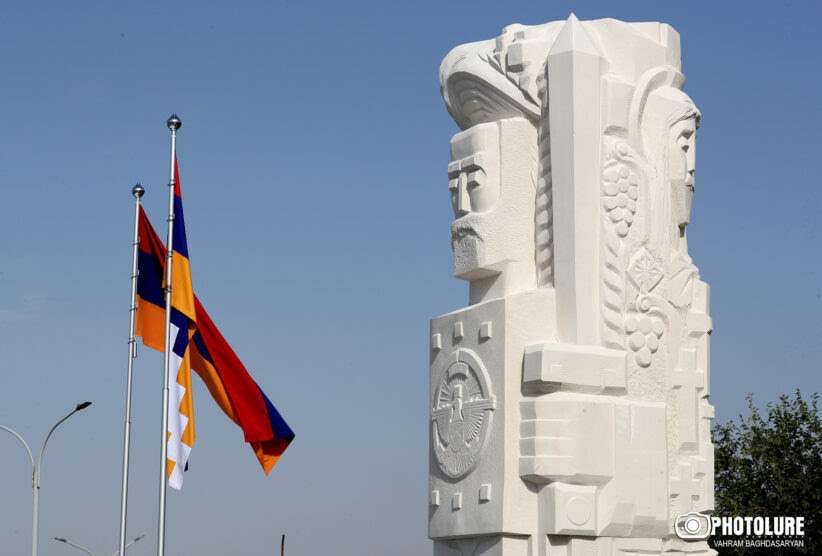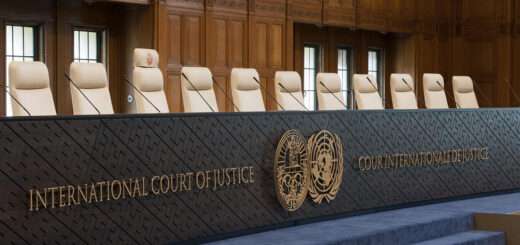Why Armenia Must not Replace One Patron with Another: Hrair Balian on Balancing Between Russia and the West

By Arshaluis Mgdesyan
Civilnet
Hrair Balian, former director of the Carter Center’s Conflict Resolution Program, has spent much of his career analyzing and working on some of the world’s most intractable conflicts—from Bosnia to Syria, and for decades, Nagorno-Karabakh. His forthcoming book, “Anatomy of Peacemaking: The Nagorno-Karabakh Conflict and Missed Opportunities,” to be published by Palgrave Macmillan in early 2026, offers a candid look at how diplomacy failed and what lessons Armenia must draw from it. In an interview with CivilNet, Balian reflected on the collapse of the peace process, the imbalance of power between Armenia and Azerbaijan, and the uncertain geopolitical shifts shaping the South Caucasus.
A weak hand at the table
Balian believes Armenia’s current position in negotiations with Azerbaijan is very weak. “Armenia today has few, if any, negotiation cards to counter Azerbaijan’s ‘might makes right’ approach,” he said. “We failed to counter Azerbaijan’s war preparations, and we didn’t take Turkey’s preparations to join the war seriously.”
According to Balian, the logic of conflict resolution is often misunderstood. “Sides don’t negotiate because they love peace—they negotiate when the alternative gives them a worse outcome,” he explained. “Azerbaijan went to war in 2020 when it became certain that Turkey would back it militarily and that Russia would not intervene. Its military ‘BATNA’— Better Alternative to a Negotiated Agreement—was stronger than ever.”
While Armenia has increased its defense spending in recent years, Balian cautioned that weapons alone will not restore balance. “Modernization is not just about procurement. The Soviet-era command structure must be fundamentally reformed,” he said. “For a small country like Armenia, strengthening alliances is equally vital. But with Russia and Iran distracted elsewhere, can the pivot to the West compensate? I don’t see the European Union taking on that role—they need Azerbaijani gas and oil. The United States appears more interested, as seen in the August 8 Washington summit, which at the very least postponed an Azerbaijani attack on Syunik. But whether that interest survives the U.S. election cycle is an open question.”
Ultimately, he argued, Armenia’s only viable cards are “smart alignment of strategic alliances and restoration of some military balance.”
The road not taken
Looking back at three decades of peace talks, Balian says Armenia’s greatest diplomatic failure came in 1997. That year, the OSCE Minsk Group proposed a phased solution postponing Nagorno-Karabakh’s final status indefinitely while formalizing its de facto independence under international recognition, complete with its own defense forces.
“Had Armenia accepted that proposal, Nagorno-Karabakh might have achieved a status similar to Kosovo’s two years later,” Balian said. “Instead, we rejected it, insisting on final status first. That was a historic missed opportunity.”
He recalled that the Minsk Group had developed six major peace frameworks during its 32-year lifespan. “The Basic or Madrid Principles were the most elaborate,” he said. “Armenia accepted them broadly but remained rigid on details—especially on the withdrawal from occupied buffer zones—while Azerbaijan rejected the proposals outright.”
The opportunity for a durable compromise, he added, was lost to political maximalism and short-term thinking. “We failed to advance creative ideas like the gradual return of displaced persons. We missed the chance to consolidate the status quo into something internationally recognized.”
“We were itching for war”
Balian did not mince words when discussing Armenia’s leadership on the eve of the 2020 war. “In 2019–2020, it seems we were itching for war,” he said. “We issued one provocative and clumsy statement after another, rejected nearly 30 years of Minsk Group work, and even threatened Turkey by talking about the relevance of the Treaty of Sèvres.”
He pointed to the July 2020 border clashes in Tavush as a dangerous turning point. In his view, those confrontations, though initially perceived as a defensive success for Armenia, “created a false sense of military confidence” and deepened Baku’s determination to settle the issue by force. “The Tavush fighting reinforced illusions in Yerevan that the army was stronger than it really was, while convincing Azerbaijan that the balance of power had decisively shifted in its favor,” Balian wrote in his book. “It accelerated Baku’s calculations that war could deliver more than diplomacy ever would.”
In his view, Armenia should have done everything possible to avoid a war it was unprepared for. “We were not ready for a 21st-century conflict,” he said. “I can’t say for certain the war could have been avoided—but we should not have provoked it.”
Russia’s pivot and Armenia’s dilemma
Russia’s evolving role in the South Caucasus, Balian noted, has fundamentally reshaped the balance of power. “Historically, the region served as Russia’s bridge and buffer between its North Caucasus and the Middle East,” he explained. “But tactically, Moscow has shifted from supporting Armenia to cultivating closer ties with Azerbaijan.”
The reasons, he said, are pragmatic rather than ideological. Russia’s strategic interests are tied to Azerbaijani energy resources and transport corridors linking it with Iran and beyond. Its recent ‘reconciliation’ with Baku proves the point.
For Armenia, the lesson is clear. “We relied too much and too long on a single strategic ally—and paid a high price for it,” Balian warned. “My hope is that we don’t repeat the same mistake by pivoting blindly to the West.”
TRIPP: Hope or Hazard?
The U.S.-backed TRIPP project, which envisions a new transport route linking Azerbaijan to Nakhichevan through southern Armenia, has become a key test of Armenia’s diplomacy. Balian called it a “potentially beneficial but risky venture.”
“TRIPP could help Armenia, depending on the details—which are still unknown,” he said. “It is to be managed by a joint U.S.–Armenian enterprise under a 99-year lease, allowing Azerbaijan unhindered access through Armenia. But the devil is in the details.”
He questioned what Armenia would gain in return. “There is still no clarity about reciprocal transit rights through Azerbaijan for access to Russia and Iran,” he noted. “And what about the 23 Armenian hostages in Baku, the right of return for displaced Artsakh Armenians, or protection of Armenian cultural heritage? The draft peace treaty ignores all of these.”
Even if signed, Balian warned, the treaty will not hold without constitutional and territorial clarity at home. “Without an enduring peace agreement and firm border delimitation mechanisms, TRIPP will fail,” he said.
When power replaces principle
Reflecting on the global context, Balian said the disintegration of the post-war rules-based order has made conflicts like Nagorno-Karabakh far harder to resolve. “The idea that ‘might makes right’ has dominated for at least the last 20 years,” he said. “We see it in Ukraine, Gaza, Sudan—and in Nagorno-Karabakh in 2020 and 2023.”
The optimism of the early 1990s, when the Cold War ended and multilateral diplomacy seemed ascendant, is gone, he lamented. “The 2003 U.S. invasion of Iraq, based on lies, killed that optimism. Since then, we’ve lived in a multipolar world where hard interests, not international law, define behavior.”
Quoting a recent New York Times editorial, he added: “Alongside uncounted human remains, any semblance of a rules-based international order lies buried in Gaza’s rubble. History shows that when might makes right, things go terribly wrong.”
For Armenia, he said, this is the hard lesson of the past five years. “We must face this old-new reality with cold calculations, not illusions,” Balian concluded.
His forthcoming book, “Anatomy of Peacemaking,” to be released in early 2026 in both English and Armenian, will delve into these themes in detail—an unflinching analysis of how diplomacy failed, and how Armenia can rebuild a strategy grounded not in sentiment, but in realism.





